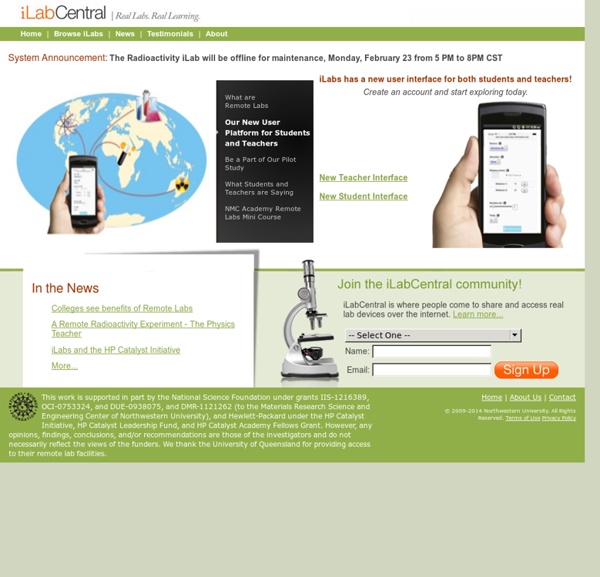



Cell Cycle & Cytokinesis - BioChemWeb.org Cell Cycle Regulation and the Control of Cell Proliferation (Cell Growth + Cell Division) Cell Cycle Research - General resource with links to relevant recent literature, news and job listings. (Ion Channel Media Group) Cell Division - Undergraduate-level lectures on cell division. (Cell Biology Lectures, Mark Hill, University of New South Wales, Australia) The Eukaryotic Cell Cycle and Cancer - Introduction to the eukaryotic cell cycle as it relates to the genetics of cancer. (Phillip McClean, North Dakota State University) (Just above Beginner's Level) ICRF FACS Laboratory Cell Cycle Analysis - Methods for cell cycle analysis using flow cytometry. (FACS Laboratory, Imperial Cancer Research Fund, UK) The Interactive Fly: Evolutionarily Conserved Pathways (Society for Developmental Biology). See also the Apoptosis, Cell Senescence and Signal Transduction pages. Mitosis, Meiosis and the Mechanics of Cell Division See also the Cytoskeleton, Cell Motility and Motors page. Cancer Resources
ChemCollective Ten Recent Advances in Evolution By Carl Zimmer Posted 10.26.09 NOVA To celebrate the 150th anniversary of the Origin of Species, here's a list—by no means exhaustive—of some of the biggest advances in evolutionary biology over the past decade. These advances include not just a better understanding of how this or that group of species first evolved, but insights into the evolutionary process itself. Ten significant leaps forward in evolution research in the past decade, as chosen and described by noted science writer Carl Zimmer Enlarge Photo credit: (Earth) © NASA; (text) © WGBH Educational Foundation Darwin envisioned natural selection acting so slowly that its effects would be imperceptible in a human lifetime. If he were alive today, Darwin would be astonished at the pace and nature of discoveries being made in evolutionary biology, including the witnessing of evolution in action. Thanks to powerful, cheap DNA sequencing technology, scientists can now pinpoint the molecular changes underlying this rapid evolution.
High School Human Genome Program educreations teacherswithapps Educreations Interactive Whiteboard, by Educreations, Inc, is an incredible, yes that’s right, INCREDIBLE app. This newly released app comes with the huge bonus of being FREE! We think this app has the edge needed to push education in the right direction and to begin modernizing teaching as we know it. Educreations Inc had the wherewithal to realize the need to add the option to use multiple pages for the same lesson; this is another feature that makes this app a standout. This revised Bloom’s Taxonomy pyramid shows classification of levels of intellectual behavior that is important in the learning process. It is obvious that the developers in this new start-up company spent much time and consideration while incorporating user-friendly features into this app.
Genome.gov Feature Genome exhibition travels to The Tech Museum of Innovation in San Jose, California Following a four-month engagement at the Reuben H. Fleet Science Center in San Diego, the high-impact interactive exhibition, Genome: Unlocking Life's Code, is making its second stop in California. Genomics and Global Health: What does the future hold? The closing symposium for the Smithsonian exhibition Genome: Unlocking Life's Code, will be held on September 30th, beginning at 1 p.m. The 2013-2014 Genomics in Medicine Lecture Series Read about and view the latest series of lectures for Genomics in Medicine. Highlights The American Society of Human Genetics (ASHG) invites you to participate in the 10th Annual DNA Day Essay Contest! Open to students in grades 9-12, the contest aims to challenge students to examine, question, and reflect on important concepts in genetics. Genome exhibition to depart Smithsonian for multi-city tour {*style:<b>*}Bethesda, Md.
NSDL.org - National Science Digital Library Science The more we understand about science and its complexities, the more important it is for scientific data to be shared openly. It’s not useful to have ten different labs doing the same research and not sharing their results; likewise, we’re much more likely to be able to pinpoint diseases if we have genomic data from a large pool of individuals. Since 2004, we’ve been focusing our efforts to expand the use of Creative Commons licenses to scientific and technical research. Science Advisory Board Open Access The Scholars’ Copyright Project Creative Commons plays an instrumental role in the Open Access movement, which is making scholarly research and journals more widely available on the Web. We’re also expanding Open Access to research institutions. We’ve created policy briefings and guidelines to help institutions implement Open Access into their frameworks. Open Data At Creative Commons, we believe scientific data should be freely available to everyone. Learn more